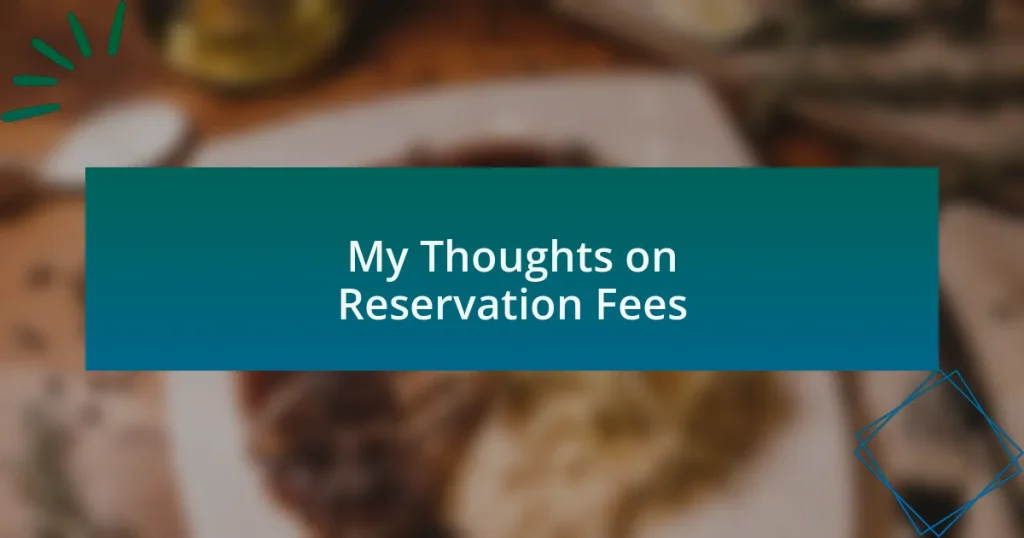Key takeaways:
- Reservation fees provide a commitment from diners, helping restaurants manage no-shows and cover operational costs.
- These fees can enhance the dining experience by encouraging serious reservations and signaling the establishment’s quality.
- Transparency in reservation policies and flexible cancellation options can build customer loyalty and trust.
- Thoughtful management of reservation fees can transform them into opportunities for both diners and restaurants.
Author: Evelyn Harrington
Bio: Evelyn Harrington is an acclaimed author known for her evocative storytelling and intricate character development. With a background in literature and creative writing, she has published several best-selling novels that explore themes of resilience and identity. Her work has garnered numerous awards, including the prestigious Waverly Prize for Fiction. When she’s not writing, Evelyn enjoys hiking the scenic trails of her hometown and engaging with her readers through her popular blog. She currently resides in Portland, Oregon, where she continues to craft compelling narratives that resonate with audiences worldwide.
Understanding reservation fees
Reservation fees, while often seen as an inconvenience, serve a practical purpose for restaurants. From my experience, they are a commitment from diners, ensuring that tables are not left empty during peak times. Have you ever walked into a restaurant only to find it fully booked, despite numerous no-shows? It’s frustrating, and that’s where these fees come into play.
When I first encountered a reservation fee, I was skeptical. Wouldn’t a simple hold be enough? But after considering the restaurant’s perspective, I realized it helps cover operational costs and potentially offsets losses from no-shows. It’s a balancing act between providing a great dining experience and managing business viability.
Moreover, these fees often reflect the value of the dining experience itself. For instance, at high-demand bistros, the fee might be a small price to pay for securing a spot for an outstanding meal. Have you ever found yourself scrimping on that last-minute reservation, only to regret missing out on something truly special? In my view, a well-managed reservation system—including fees—can enhance the overall experience for everyone involved.
Importance of reservation fees
Reservation fees play a crucial role in maintaining order and enhancing the dining experience at popular restaurants. I remember a time when I arrived at a bustling bistro without a reservation, only to be told it was fully booked. The disappointment of seeing empty tables while waiting was frustrating. A reservation fee could have ensured that those tables were genuinely reserved for committed diners, making the experience smoother for everyone.
Moreover, these fees help establish a sense of seriousness about dining reservations. I’ve noticed that when people invest even a small amount financially, they are more likely to honor the commitment. Have you ever made a reservation and realized you wouldn’t have cancelled it if there was a fee involved? This runs parallel to my own experiences; I’m much more likely to keep a reservation if I’ve taken the extra step of financially committing to it.
Finally, incorporating reservation fees can also signal the restaurant’s quality and exclusivity. I once dined at an upscale eatery that charged a modest fee to secure a table. The experience was nothing short of exceptional. The ambiance, the service, and the meal were all elevated because diners were genuinely committed to enjoying what the restaurant had to offer. Isn’t it worth considering how reservation fees could enhance not just individual experiences, but the overall vibe of a restaurant?
Common practices in British bistros
When I think about the common practices in British bistros, one of the first things that comes to mind is the warm and inviting atmosphere they strive to create. I recall stepping into a charming bistro one rainy evening, where the aroma of freshly baked bread enveloped me. It was a reminder of how these establishments often focus on creating a cozy environment that makes diners feel at home, encouraging them to linger a little longer and savor their meals.
Another noteworthy practice is the emphasis on seasonal ingredients. It seems that many British bistros take pride in using what’s fresh and local, which not only enhances the flavor of the dishes but also connects diners to the region’s culinary traditions. During a recent visit, I enjoyed a dish featuring spring asparagus—its vibrant color and crisp texture were a delightful highlight. How many times have you tasted something so fresh that it instantly made you appreciate the chef’s attention to detail?
Finally, I’ve noticed that British bistros often encourage social dining by offering communal tables or sharing platters. This creates an atmosphere of camaraderie among diners, fostering connections over delicious food. I remember a lively shared table experience where strangers turned into friends, simply over a shared love for hearty pies and good conversation. Isn’t there something special about breaking bread together that enhances the overall dining experience?
My experiences with reservation fees
When it comes to reservation fees, my experiences have been quite varied. I recall dining at a popular bistro during a busy holiday season. It was a bustling evening, and I appreciated the restaurant’s request for a small deposit to secure my table. It was a relief to know that my spot was guaranteed amidst the hustle and bustle, but it did make me ponder—do I value the peace of mind enough to part with a fee?
On another occasion, I encountered a more perplexing situation. I booked a table for a special anniversary dinner, excited to celebrate, but was taken aback by a non-refundable reservation fee. While I understood the importance of planning for the restaurant, I couldn’t shake the feeling of being nickeled-and-dimed. It left me questioning whether such fees enhance the dining experience or simply add another layer of stress upon making reservations.
Then there’s the memorable instance where the reservation fee was waived entirely, as the bistro was launching a new menu. I felt valued and welcomed, as if my presence truly mattered to them. This made me reflect on how managing reservation fees can shape a diner’s relationship with a restaurant—could transparency and flexibility encourage more customers to return? Ultimately, my experiences highlight the fine line between ensuring a worthwhile commitment and fostering genuine customer loyalty.
Recommendations for handling reservation fees
When it comes to handling reservation fees, it’s essential for restaurants to maintain transparency in their policies. I remember a time when I visited a cozy bistro that clearly outlined their reservation terms on their website. This approach not only built trust but also alleviated any apprehensions I had about hidden costs. Have you ever been surprised by unexpected charges? Clear communication could easily prevent that.
I find offering a flexible cancellation policy can significantly improve customer satisfaction. For example, a friend of mine once faced an emergency that forced her to cancel a reservation. The bistro waived her fee, and she was so grateful she ended up recommending it to several others. In my experience, a little understanding can go a long way in nurturing customer loyalty.
Lastly, consider implementing an incentive for customers who pay the reservation fee. I’ve noticed some establishments offer a discount on the final bill as a reward for prepayment. This not only encourages diners to commit but also creates a sense of value. Have you ever felt more inclined to return to a restaurant because of such thoughtful perks? Simply put, managing reservation fees with care can transform an obligation into an opportunity for both the diners and the restaurant.
Final thoughts on reservation fees
Final thoughts on reservation fees
When considering reservation fees, it’s crucial to balance the restaurant’s need for security with the customer’s experience. I recall dining at a charming bistro that charged a modest reservation fee but explained its purpose perfectly. The owner shared that these fees help manage no-shows, which significantly affect small businesses. Do you appreciate understanding the reasoning behind such fees?
On another occasion, I encountered a bistro that applied the reservation fee toward the final bill. This smart strategy made me feel like I was investing in my dining experience rather than merely paying for a spot. Isn’t it reassuring when your money feels like it’s working for you? This method fosters a welcoming atmosphere where guests feel valued and engaged.
Ultimately, the way reservation fees are handled can significantly enhance or detract from a guest’s experience. I often reflect on the importance of these fees in making dining reservations feel special and secure. Have you found that a well-implemented reservation fee policy can elevate your dining experience? From my observations, when done thoughtfully, it not only protects the restaurant but also cultivates happy, loyal diners.


